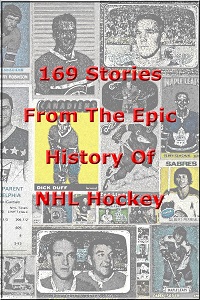The 1968-69 O-Pee-Chee NHL hockey card
set was significant for a few important reasons. It marked the first
O-Pee-Chee set since the very early 1940’s. It also marked the
first time players from the 1967 NHL expansion teams were featured on
cardboard.
The set consists of 216 cards, 84 than the Topps sister
set. The book value for a full set of 216 is $2,500 while a common
card is valued at $8. Like all sports card set, this one celebrates
the season before, in this case, the 1967-68 National Hockey League
season.
While the whole set is important to any
hockey card collector, there are six must have 1968-69 O-Pee-Chee
cards. Not surprisingly, three of the six feature Bobby Orr of the
Boston Bruins.
Bobby Orr - 2
The number 2 card is the most valuable
with a book value of $350 and is the regular card of Bobby Orr. $350
is great but a far cry from the $3,000 his 1966-67 Topps rookie card
is valued at but still one of the more valuable
Bobby Orr hockey cards. 1967-68 was Orr’s second year in the league and, due
to injury, played just 46 of Boston’s 74 regular season games. The
star defenseman scored eleven goals and assisted on 20 for 31 points.
In the Stanley Cup playoffs, Orr played
all of Boston’s four games as the Bruins were swept in the opening
round by the Montreal Canadiens. This was significant as it was
Boston’s first playoff series since 1958-59 when they fell in the
opening round to the Toronto Maple Leafs. It meant that the building
of a championship team had begun and in just two short years, the
team would hold the Stanley Cup.
Checklist - 121
The number 121 card is a simple
checklist. Yet, this hockey card is valued at $250. Checklists first
appeared as part of the 1961-62 Topps set. Often, checklists from
vintage hockey card set are valued high.
In some cases, they are the
most valuable cards in the set. Why? The checklist was a booby prize.
These unwanted cards were often thrown away without a second thought.
It is due to shear scarcity that they are sought after cards decades
later.
Bernie Parent - 89
The number 89 card is the highest
valued rookie card in the
1968-69 O-Pee-Chee set. Also valued at $250, this card features
goaltender Bernie Parent of the Philadelphia Flyers. Bernie’s NHL
career started in 1965-66 with the Boston Bruins. Despite being the
number one goalie on the team and playing in 39 of Boston’s 70
regular season games, Topps did not release a hockey card with his
mug on the front.
1967-68 was Bernie’s third year in
the NHL. He probably would have been part of the 1967-68 Topps set
but, as mentioned, players from the six expansion teams were not
included for some reason. Parent played in the NHL until the end of
the 1978-79 season. In 1973-74 and 1974-75, he helped the Flyers win
consecutive Stanley Cup championships. In each of those seasons,
Bernie was awarded the Vezina Trophy and the Conn Smythe Trophy. He
is now a member of the Hockey Hall of Fame.
Bobby Orr - 200
The number 200 card shows Bobby Orr as
a First Team All-Star. This card is valued at $150 and is the highest
valued of the all-star cards. 1967-68 was the first of eight
consecutive years that Orr was named a First Team All-Star
defenseman.
The other defenseman on the First Team
was
Tim Horton of the Toronto Maple Leafs. None of Bobby’s Boston
teammates were on the first squad but Phil Esposito was Second Team
centre and Johnny Bucyk was Second Team left wing.
Bobby Orr - 214
The number 214 card is yet another
belonging to Bobby Orr of the Bruins. This time, Orr is being
honoured as the recipient of the Norris Trophy as the NHL’s top
defenseman. Like his all-star selections, this marked the first of
eight consecutive times he would win the award.
This is the highest valued of the
special trophy cards in the set. The next most valuable belongs to a
teammate of Orr.
Derek Sanderson is on the front of card number 213
as the Calder Trophy winner as rookie of the year. Bobby Orr won the
same award the year before.
Gordie Howe - 29
The number 29 card belongs to the great
Gordie Howe of the Detroit Red Wings. This card is valued at $100 and
is a long, long way from the 1951-52 Parkhurst Gordie Howe rookie
card that has a book value of $3,000.
In 1967-68, Howe scored 39 goals and
assisted on 43 for 82 points while playing all 74 regular season
games for Detroit. He placed third in the NHL for goals, behind Bobby
Hull and Stan Mikita of the Chicago Blackhawks. Howe was eighth in
the league for assists and third in the race for the Art Ross Trophy
behind Mikita and
Phil Esposito.
Gordie did this all on a Red Wings team
that finished last in the six team Eastern Division and second last
overall in the 12 team NHL. Detroit had the second most goals scored
in the league but they also allowed more goals than any other team in
the NHL in 1967-68.


























